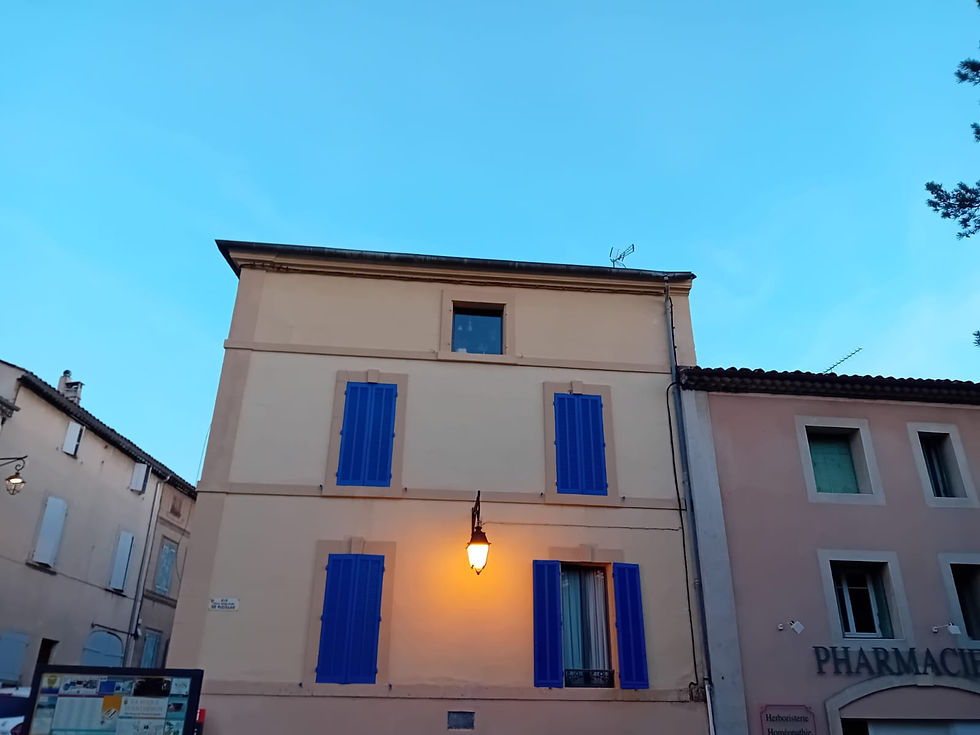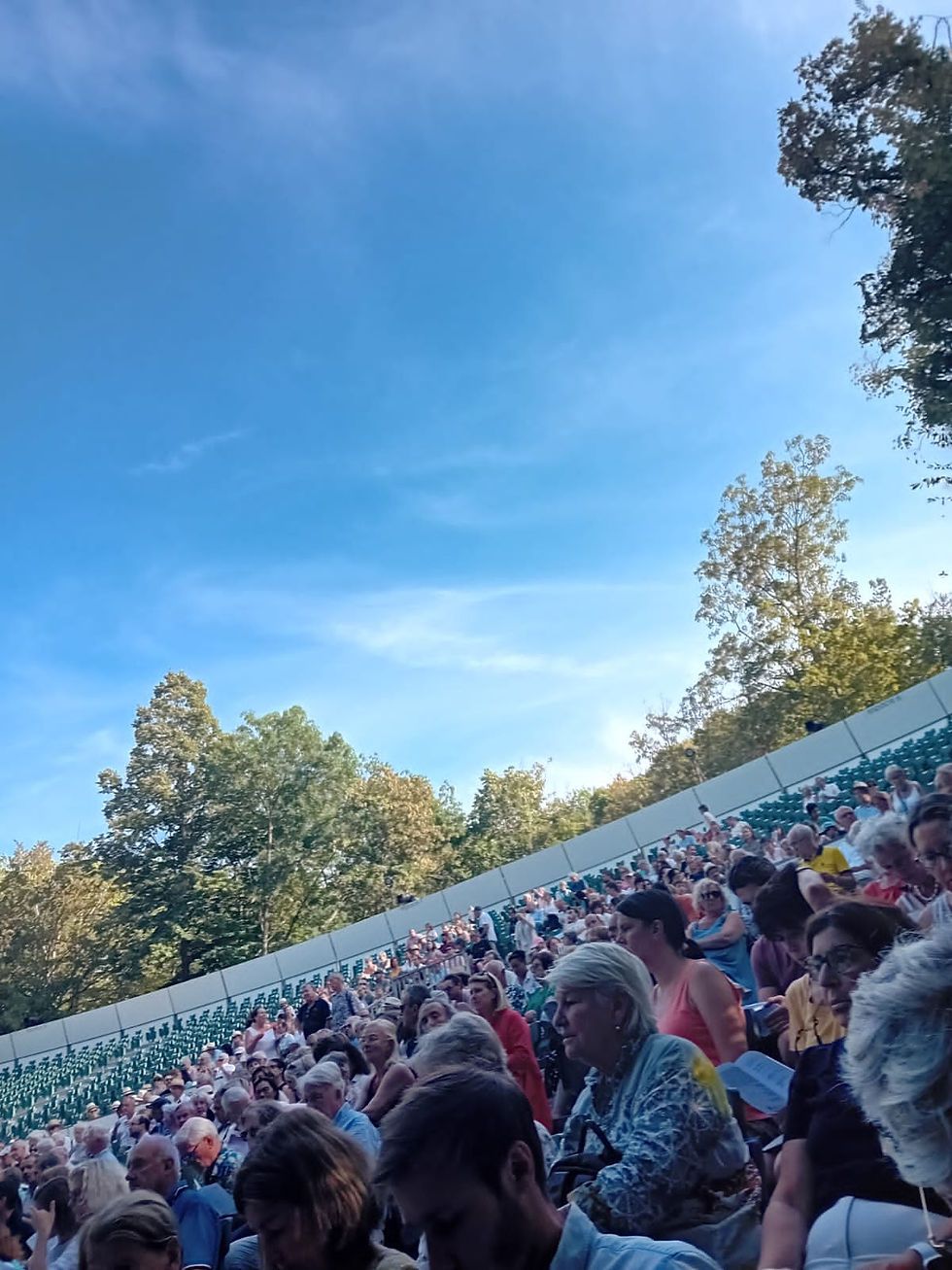Festival International de Piano La Roque d'Anthéron: Dreamers
- Marina Drozdova

- Aug 24, 2023
- 4 min read
Updated: May 20, 2024

For more than four decades, the International Piano Festival of La Roque d’Anthéron has gathered outstanding pianists and remarkable audiences. La Roque d’Anthéron is a hamlet some 25 miles away from Aix-en-Provence. In daylight, the village is totally empty and utterly silent: arriving a few hours before the concert, you find yourself inside a de Chirico painting—perhaps the “Mystery and Melancholy of a Street”—shadows, walls, voiceless vacant pavements. But when the night falls… Nightfall kindles “The Empire of Light” by Magritte. And sheer mystery. Of course, there is always an intrigue around who will play in what way. But the spectators themselves are no less fascinating: squinting, peering, counting beats—as if they are scanning the sounds that melt into the foliage of the old park.
…A bus takes a lone music lover from Aix-en-Provence along an alley pierced by sunlight. Landscapes slumber in unnerving silence. La Roque d’Anthéron has a couple of coffees, which wake for a few evening hours. The chirping of grasshoppers, and occasional clinking of glasses and forks from behind the fences, only accentuate the silence—all possible lodging in the hamlet had been rented far before the concerts. Finally, closer to the alley that leads to the stage, the first music lovers appear, and then there is more, and more, and more of them… Crescendo rises, as in Ravel’s “Boléro.”

Valentine Chauvine/ Festival International de Piano La Roque d'Anthéron.
This evening was Marie-Ange Nguci’s concert, and it was phenomenal. From thirteen years of age, this Albanian pianist studied at the Paris Conservatory, then in Vienna and in New York. She has been a polyglot from birth.
She enters the stage. Tentatively, sideways. A bit nerdy spectacles, somewhat baggy suit, as if it came from someone else’s shoulder or from someone else’s closet—a stranger’s closet in an empty apartment, with windows sealed for the summer and dust flying... A character from a faded page of an antiquated teenage book. Harry Potter’s twin. But, I suspect, the image was intentional, thought-out.
She plays. First she herself falls into another dimension (Alice in Wonderland? No, she is no eccentric girl, but, a mathematician equipped with precise navigation...), and then we follow her.
The program:
Bach/Busoni: Chaconne in D Minor, BWV 1004
Ravel: Gaspard de la nuitBeethoven: Fantasia in G minor, op. 77 Schumann: Kreisleriana, op. 16
Gaspard de la nuit by Maurice Ravel. Needless to say, Ravel was called a “geometer of mystery.” And Nguci turned the score into a spectacle of spiritual images. A special gift to listeners: her incredibly subtle feel of the keyboard animated Ravel’s famous mysticism and “horror.”
Fantasia in G minor op. 77 by Beethoven gave Nguci a chance to reveal her talent for “materializing” sounds—like an ultraviolet light or a chemical reagent manifests invisible ink. Like jazz, or magic, or vivid dreams. According to researchers, this fantasy stemmed from an improvisation, which Beethoven presented on December 22, 1808, at his marathon program in Vienna.
In Kreisleriana, Nguci became an excellent storyteller and developed the theme of torn pages. An effect of the score’s pages getting jumbled—foreshadowing improvisation—already emerged in Beethoven’s Fantasia. As for Kreisleriana, it is known (from “The Life and Opinions of the Tomcat Murr together with a fragmentary Biography of Kapellmeister Johannes Kreisler on Random Sheets of Waste Paper” by E. T. A. Hoffmann) that Murr, while expounding his worldly views, ripped up books from his owner’s library in order to use the torn pages to dry the ink. And this is exactly how the biography of Johannes Kreisler, an insane musician immersed in obsessive thoughts, made its way to the readers. Nguci’s performance was brilliant clownery.

During the intermission, together with our neighbors—sharing a row of seats or enjoying a glass of champagne—we discuss our childhood stories about the fortepiano. The plots thicken and—as soon as the darkness embraces the pines that surround the outdoor concert—the ghosts of pianos past seem to multiply like in the famous “ballet of pianos” from “Gold Diggers of 1935” by Busby Berkeley. This is because Nguci, ceremoniously, though without pomp, opened portals to the spectators’ own fantasies.
And for an encore: an extract from Maurice Ravel’s Concerto for the Left Hand in D major, Etude No. 6 op. 111 “Toccata after concerto no. 5” and Etude no. 4 “Les Cloches de Las Palmas” by Camille Saint-Saëns and the Tomb on the death of Monsieur Blancheroche in C minor by Johann Jakob Froberger.
Together with my melomaniac neighbors, I wonder: what are the origins of our affection for La Roque d’Anthéron festival and the fortepiano concerts? Is this Lisztomania or laziness? Lisztomania refers to a person’s dependency on listening to music. It was invented, as you know, by Heinrich Heine, denoting the state of agitation and ecstasy, bordering on madness, at the concerts of Franz Liszt. Heine wrote about Liszt’s bifurcation of sorts into a man and his genius—this is where the excitement began. And the audience split as well: one moment you are sitting quietly in the concert hall, and the next—you are in-between the notes. During Liszt’s times, the mania went even further: broken strings were turned into ladies’ bracelets, and ashes from the genius’ cigars were kept in a jewelry box...
We recall the words of Sviatoslav Richter (captured in the book “Sviatoslav Richter: Notebooks and Conversations” by Bruno Monsaingeon): “...I prefer, having arrived in any country, to lay out a map and point out to my impresarios the places that connect with something for me or that arouse my curiosity and, if possible, that are still unknown to me. We depart in a car, followed by pianos. We avoid highways like the plague. It is unknown whether I would play in a theater hall, in some chapel or in a schoolyard... or in some corner of Provence. At least, people will come not out of snobbery, but to listen to music...”




Comments